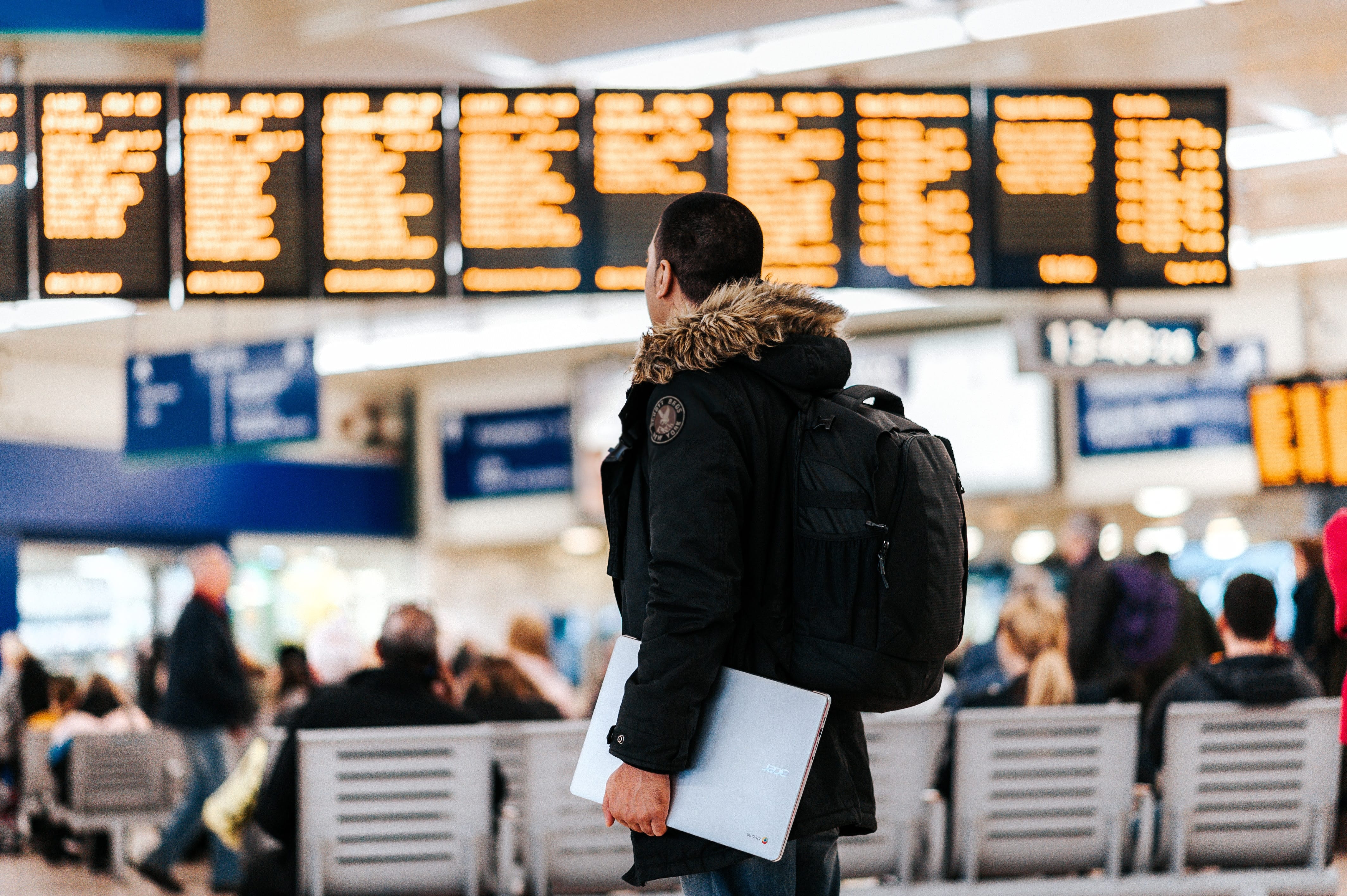
The idea of getting stranded at the airport is every traveller’s worst nightmare. It can mean frustration, confusion, and often a lot of waiting and can even prove a drain on your travel fund. To make sure you’re prepared the next time you face a delay or cancellation, we’ve put together five essential tips every traveller needs to know.
1. Find an alternative mode of transportation
Often when facing a cancelled or delayed flight, our instinct is to immediately put ourselves on another flight. Often this can come with extra added costs, particularly if you’re trying to book a last-minute fare with an airline different to your original carrier. But think laterally: there’s usually more than one way to get from A to B.
Consider taking a bus, train, or even a ferry or rental car (if available) to your destination instead of flying. A bus or train fare can often be cheaper than a last-minute plane ticket, and you can avoid the airport crowds and queues that delays can cause.
Rome2Rio makes finding alternate means of transport easy. Simply plug in your origin and destination and we’ll show you how to get to where you want to go almost any way there is to get there.
In some cases, however, flying may be your only option. If you happen to find yourself in this situation, read on.
Related article: 7 ultimate tips to survive a long-distance bus ride
2. Find a second city
Getting stranded at the airport can be made even worse if there simply aren’t any flights (or other means of transport) to your destination. But that doesn’t mean there aren’t ways to get to a city nearby. Again, Rome2Rio can help you find nearby cities and towns that may have airports from where you can fly out to your intended destination.
Rome2Rio will instantly show you any routes to nearby cities and towns (as well as accommodation, should you need to stay overnight), and you can also work with local carriers and operators. Smaller airlines will sometimes service areas outside major cities, and bus and train operators may have a stop just close enough to where you want to get to.
3. Get a room
In some cases, you may find that there simply is no way to get home that day, especially if you’re stranded due to extreme weather conditions or a natural disaster. In these cases, it’s best to stay put and find affordable accommodation somewhere close to the airport. Luckily, you can use Rome2Rio to find available rooms in the area.
You’ll want to act fast, since other travellers will be scrambling to book up any available rooms. Being quick will help you secure accommodation within your price range and without having to travel too far. You may even be able to find a local hotel that will accept frequent flyer points as payment or offer discounts for certain credit-card holders or priority airline members.

4. Whip out the credit card
Delays and cancellations can mean long lines and maddening crowds, but matters can be made worse still if you’re left without funds. This is exactly what happened to one Primera traveller who was stranded at a US airport without money for a next-day flight or even a hotel after the company suddenly collapsed.
This is where your credit card comes in handy. No, we don’t mean simply putting the airfare on the plastic. If you booked your travel with a credit card, you may find that your provider can help you out in the event of delays or cancellations.
If you find yourself stranded and broke, get on the phone with your credit card company and enquire about your options. Depending on the terms of your card, they may in some cases cover the cost of accommodation and even meals up to certain dollar amount.
5. Use social media
It’s likely you’re not the only one dealing with a delay, cancellation or the complete collapse of an airline. Once you’ve waded through all of the people inevitably airing their frustrations, social media can be a powerful tool to find an alternative means of transportation.
Use Facebook and/or Twitter to check:
- whether the airline or airport have made any official announcements
- whether other airlines have announced flights or special deals in response
- what other stranded passengers are doing (you may just uncover a good idea or two)
- what the best or most economical choices for accommodation are in the area
In these situations, it’s important to arm yourself with as much information as possible, and social media, as well as the alerts page of your carrier’s website, can be a great way to stay on top of the latest developments. For example, in addition to their numerous social media accounts, Aussie airline Jetstar maintains a Travel Alerts page on their website where travellers can check for news about affected flights.
6. Keep checking back
Tough situations like getting stranded reward the determined and the diligent. Once you’ve made a list of all the resources–websites, social media accounts, kiosks, and staff members–to check in with regarding outbound flights, make sure you keep checking in with them. This is particularly important in cases where bad weather is affecting multiple flights and airlines and as a result, causing other passengers to miss connecting flights, freeing up a seat or two that could be yours, if you’re diligent.
If you want to take things to the next level, set up some alerts on your phone to remind you to check in every half-hour or so. This will ensure you don’t get distracted and forget to check in, but that you’re not simply refreshing your phone screen every few seconds or raising the ire of airport staff with frequent update requests.
7. Find the best place to sleep, if you have to
In some cases, you may find yourself without a hotel room or a means to get home and having to stay overnight at the airport. It’s not the worst thing that could happen. After all, you’ll be in a temperature controlled environment with plenty of security staff, and close to where you need to be the next day. If you indeed find yourself having to sleep at the airport, it’s important to keep a positive attitude–think of it as a bit of an adventure and a story to tell others when you finally get home.
To ensure your overnight stay at the airport is as comfortable as possible, stake out some prime real estate near the arrival lounges if these areas are open overnight. Sleeping across several seats will be more comfortable than napping on the terminal floor. If it’s likely you’re not the only one sleeping rough, get there early and pick your spot wisely. In other words, choose a comfortable-looking area that’s near a power socket or charging station.
In some cases, the airport may even provide cots for stranded travellers to use overnight. Sleeping in Airports, a blog dedicated to the art of sleeping at gates and in departure lounges, actually keeps a list of airports who provide such cots.

8. Be prepared
There’s few worse feelings than needing something when you don’t have it, which is why you should expect the unexpected and always be prepared for a delayed or cancelled flight whenever you travel. Treat this as a rule of thumb regardless of how many times you’ve travelled this route or how short your stay may be. For example, try to keep anything that could come in handy in the event of a delay in your carry-on, so that you definitely have it with you at all times, such as your phone and laptop chargers and any necessary adaptors.
If it looks like you have an overnight stay at the airport ahead of you, prepare by staking out a good spot to sleep as well as ensuring you won’t find yourself hungry later in the evening. Hit the food court before everything closes and stock up on some choice items from the vending machines to save yourself having to leave your bags and valuables should you start to feel a bit peckish after dinner. Another good rule of thumb is to keep some form of reading material with you at all times when travelling, whether a small paperback or a magazine.
9. Learn your environment
Each airport is different, with different operators, facilities, amenities, and even opening hours. Do everything you can to understand the environment you may find yourself in for the next several hours. Check the airport’s official website, if they have one, or speak to a member of the airport staff. Make sure you ask important questions such as:
- Is the airport open 24 hours?
- Will I be able to sleep here overnight, if need be?
- Do you have free public showers?
- Is there free WiFi? How can I access it?
- Are there charging stations for phones and laptops?
- Does the lounge offer day passes?
Try to find out any other information that could make your airport stay easier or more comfortable. It’s particularly important to stay informed should you find yourself stranded at a small or regional airport, which are likely to have different rules and facilities compared to major airports.
10. Be productive
Sometimes there’s simply nothing you can do to get the outcome you want. If no planes are leaving and other modes of transport are out of the question, you may find yourself staying put for at least a night. Use this time wisely.
Being stranded at the airport can be painfully boring, as you’re often simply waiting around, frustrated at the situation. This is true even if you manage to book a hotel room. Quell boredom by catching up on any work you may have been putting off, such as cleaning out your email inbox, updating your LinkedIn profile, or even making a thorough to-do list for when you finally get home. Keeping yourself busy in this way will not only distract you from the situation, but will also see you using your time in travel limbo wisely and productively.
11. Contact your insurance provider
Travel insurance exists for a reason. Whether you’ve found yourself injured or sick when abroad or you’re facing a cancelled or delayed flight, make sure you spend part of your in-limbo time on the phone with your insurance provider finding out about the terms of your trip cancellation/interruption coverage. Though you likely won’t get a refund in time to purchase that last-minute ticket home, it’s important to stay in touch with your provider and arrange any reimbursement you may be owed as soon as possible.
Though every provider may have different covered reasons for trip cancellation or disruption, you’ll find that most providers will cover the most common reasons for why a trip may be cancelled or delayed, such as bad weather or issues with the airline.
12. Remain calm
Above all, it’s important to remain calm and remind yourself that you will eventually find a way to get home. It’s easy to panic when stuck in a strange place with seemingly no options, but that will only make the experience harder.
Think of your situation as a problem to be solved, and remain cordial with airport and airline staff – they could end up being your closest allies.